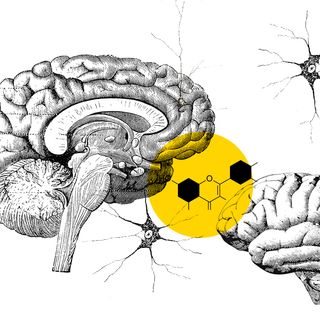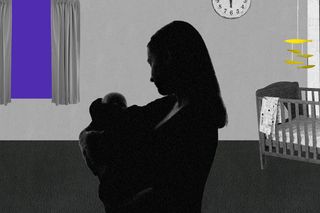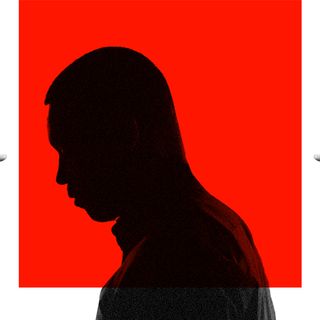
The Pandemic Has Caused a Postpartum Depression Crisis in India
With mental health care at a breaking point, new mothers are increasingly isolated and left to fend for themselves.

My son was 4 weeks old when I pictured him dead. It was early May — he had been born nine days after India locked down in an attempt to forestall the worst of the pandemic. All of our plans had been thrown off, all our family had stayed home. I had spent the last three weeks of my pregnancy in a mounting state of anxiety and panic attacks. An emergency C-section, from which my husband was barred and which left me insensible for hours after, hadn’t helped. I lay masked under five blankets in my hospital bed thinking, “There’s a baby here somewhere. I should care.” I didn’t.
Swaddled in a tiny, immovable bundle weeks later, chin sunk in boneless folds, the translucent skin of my son’s eyelids showed gray in the dim night light. This is how he would look at his funeral, I thought. Maybe he’s dead now. Maybe I wouldn’t be sad.
He was five weeks old on Mother’s Day, which I spent vacillating between resentment at my husband for not making it special, insecurity about whether I even deserved to be celebrated as a mother, and jealousy of my sister, who had celebrated the day with our parents. They were supposed to be with me, I thought. As I watched them cuddle their other grandchildren on Zoom, an image came to mind of my son with a golf club wrapped around his throat, his neck stretched and squeezed, his face red. I wondered idly why a golf club — I don’t golf.
Maybe I wouldn’t be sad.
A few days after that, my husband and I were hanging limply over leftovers. I was making it hard for him to be excited about the baby, he said. Are you okay? I apologized. “I wonder,” he said, and paused. “… if we made a mistake?” I suggested.
No. No, he hadn’t wondered that. He hadn’t wondered that at all.
*
Postpartum depression affects roughly one in five women — or at least that was the number before 2020. For almost a year now, a silent crisis of postpartum anxiety and depression has been playing out among women who have been pregnant and/or given birth amid lockdowns and the ongoing threat of contagion. In Spain, 15% more women have developed symptoms of postpartum depression than pre-pandemic rates. In the U.K., where pre-pandemic rates of postpartum anxiety (PPA) and depression (PPD) used to hover around 15%, roughly 43% of women with babies between birth and 12 weeks during the country’s first lockdown met the criteria for PPD; 61% checked the boxes for PPA. Most had not received diagnoses, amid mass disruptions to pre- and postnatal care.
Multiple papers suggest India fares no better, though it lacks a nationwide count. One small-scale survey of OB/GYNs suggests perinatal anxiety — a predictor of PPA and PPD — was as high as 68% among pregnant women in India during the lockdown. Anecdotally, OB/GYNs and psychiatrists across the country report treating record numbers of PPA and PPD cases that they all attribute to the stress of the ongoing pandemic and earlier lockdown.
“This time, every pregnancy I dealt with was hounded by insecurities and constant questions, WhatsApp messages. … All of this anxiety built up because of the pandemic,” says Dr. Archana Nirula, an OB/GYN in Delhi and a coordinator with Postpartum Support International. “Never have I seen mothers reacting this way.”
*
Since the 1970s, research has painted an ever-clearer picture of the mental health vulnerability that follows childbirth. Postpartum anxiety and depression are terms that don’t quite do justice to the constellation of symptoms that women may experience. Some combination of sadness, irritability, tearfulness, rage, appetite changes, anxiety, tension, and/or changed sleep patterns characterize postpartum depression, along with thoughts that are “intrusive, unwanted, and inconsistent with one’s typical personality or behavior,” according to medical experts, and “… fears of even thinking these thoughts, particularly when they involve thoughts of harm to their baby.”
Historically, nearly all cultures have had traditions that recognize the weeks following childbirth as a vulnerable time for women. In India, the confinement of mother and baby anywhere from 10 to 40 days postpartum is common. During this period, women are cared for, typically by their own mothers. But in a pandemic that has separated families and made physical touch taboo, a practice of further confinement holds the potential to exacerbate mental health struggles.
The first night after delivery, S. cried. “Why can’t you be next to me?” she asked her husband. “I’m really missing you.”
S., who is based in Kolkata, hadn’t seen her doctor for months prior to her delivery, as OB/GYNs across the country had shuttered in-person services for non-critical pregnancies. Despite all appearances of a healthy pregnancy, she says she felt “very anxious.” She worried that she hadn’t had the normal check-ups and scans. She hadn’t been able to purchase supplies to prepare for the baby because stores had closed. Her parents, who had planned to visit for the birth, had been stranded in a different metro. She hadn’t seen a friend in months.
Once home after giving birth, she observed the traditional confinement for several weeks, staying alone in her room with her baby and an infant nurse while her husband slept separately. “Why can’t he be in the same room as me?” she remembers wondering. Slowly, so slowly, that questioning turned to rage. Even after her husband shifted back into their room, “all [would be] fine during the day, but anything could tick me off in the evening,” she says. For months, she says, she felt an “extreme rage” that made her “verbally very aggressive” over the slightest prompts — say, if her husband didn’t hear her ask for a diaper. “I don’t know why the rage was there,” she says. “It was just there.”
Related on The Swaddle:
Nearly As Many New Dads Likely to Get Postpartum Depression As New Moms
A 2018 review of research on postpartum depression identified anger as an overlooked symptom — one most common among women with PPD whose reality didn’t match their expectations of motherhood and support. In a pre-pandemic world, the birth of a new child would upend a household, but it would be a known unknown — one that others had experienced and one that could generally be prepared for.
Covid19 disrupted expectations of life on a mass scale, not just of parenthood for the individual; the birth of a child simply made a scary, bizarre, precarious day-to-day existence even more unrecognizable. S. remembers driving through empty streets to pick up diapers left on the curb beside a shuttered shop. I cut up two of my T-shirts in an attempt to fashion homemade cloth diapers when our stock of disposables ran low during lockdown. These are experiences one might expect in the wake of natural disasters — events that are linked to higher rates of PPD — and in a way, they were. But it would be months before anyone would recognize the pandemic as such publicly.
*
In the meantime, the pandemic exacerbated other risk factors for PPA and PPD, as well.
“Reducing social support is the most important environmental factor in the onset of depression and anxiety disorders [after birth],” notes a 2017 review of PPD risk factors. The term social distancing, now so colloquial, encapsulates how individual social safety nets collapsed during the pandemic.
Additionally, multiple studies, including research in India, have established domestic violence as a risk factor for postpartum depression; similarly well documented are the soaring rates of domestic violence under pandemic lockdowns. Rates of unwanted pregnancy, another risk factor for postpartum depression, have also shot up around the world as lockdowns and the ongoing pandemic cut off already scarce access to contraception and abortion.
For pregnant women who already have at least one child — common in India, where the average birth rate is 2.2 children per woman — the strain of having to care for more than one child (a typical risk factor for PPD) was compounded by the lockdown and pandemic, which created a childcare crisis as daycares and schools shut, nannies isolated at home, and neighbors and even family kept their distance.
“[These new mothers] had anxiety and guilt about not doing enough, not being able to take care of their older children. Lots of frustration, they were having meltdowns,” says Dr. Ruth Fernandes, a Pune psychiatrist who specializes in prenatal and postpartum mental health.
And finally, there is the element of trauma. Postpartum post-traumatic stress disorder, or P-PTSD, is an even less understood postpartum mood disorder that affected about 5% of postpartum women in pre-pandemic times. Amid harrowing reports of women becoming sick with Covid19 during pregnancy, of laboring women being turned away by overburdened or fearful hospitals, of hospital policy changes denying women companionship in the delivery room, on top of the pandemic’s collective trauma, it’s a safe bet rates of P-PTSD have increased, too.
Related on The Swaddle:
The Postpartum Complication Often Mistaken for New‑Mom Stress, or Postpartum Depression
Most women experience the ‘Baby Blues,’ a roughly two-week period of moodiness, irritability, and weepiness that starts within a few days after birth. Postpartum mood disorders begin to appear two to three weeks after birth and are more sustained, less variable states. The line between the two can be difficult to track, and amid a broader, much-covered mental health crisis due to the pandemic, anxiety or depression might simply seem less like a postpartum complication and more like the new norm for everyone — especially for people who are unaware of PPA and PPD.
*
Harshali Khandekar, 34, of Mumbai, gave birth in February 2020. For a whole month, she was happy, spending every day at her son’s side in the hospital’s neonatal ICU. But once the lockdown went into effect, the hospital barred all visitors, including parents.
“All we were surviving on was the update call that would come every morning around 10ish from the senior doctor, and some photos they sent,” she recalls.
In retrospect, she dates her depression to this time. “I remember telling myself: the biggest achievement of my day was just pulling myself out of the bed,” she says. “I would request one toe. One finger. One hand.”
“Even until then, I really didn’t know there was something called postpartum depression,” she adds. Her family was supportive, but they attributed her lowness to the forced separation from her child.
Khandekar was reunited with her baby after 20 days. But still, “I had a really unsettled feeling within me,” she said. “You know [the separation] is what is causing [the depression], but then — it’s not what is causing it. … I thought, ‘Everyone has a baby, things change, life changes. Maybe this is just the way things are going to be.’”
A chance suggestion from an acquaintance at the hospital sent her to a psychiatrist, who diagnosed her with classic and severe PPD requiring medication. The categorical delivery of the diagnosis, however, left her feeling alienated from it. She was determined to prove him wrong and embarked on yoga, gratitude journals, self-talk. But her favorite coping mechanism — one scientifically linked to improved mental health — wasn’t possible due to the lockdown.
“I was so looking forward to going out for my runs — they probably would have soothed me, calmed me,” the marathon runner says.
Her depression got worse.
After several weeks, Khandekhar sought a second opinion. This psychiatrist walked her through the diagnosis and addressed her concerns, especially around breastfeeding, and helped her understand “I had to put on my oxygen mask first,” she says, referencing the instructions flight attendants relay before take-off.
She started an antidepressant, but such medicines require weeks to take effect. During that time, “I felt like a fish caught in a net. I was so desperate to feel like myself,” Khandekar recalls. Finally, by about four months postpartum, she could again sense the bubbly, celebratory, live-in-the-moment person she’d always been.
“The feeling of relief was massive,” she says, adding she wishes she had started the medication when it was first prescribed. “I don’t have to be a changed person. I am back.”
*
That relief doesn’t typically arrive without diagnosis and treatment. But diagnosis and treatment have been difficult to come by. The pandemic overwhelmed India’s insufficient number of mental health care professionals by prompting a run on their services. While OB/GYNs can screen women for mental health struggles during and after pregnancy, the pandemic disrupted care. Prenatal and postpartum checkups were conducted over the phone — when they were conducted at all. Not meeting patients in person makes it more difficult for practitioners to pick up on the subtle signs that all might not be right, Dr. Nirula says.
Related on The Swaddle:
The Postpartum Condition Mistaken for the Joy of New Motherhood
Even in the best of times, however, it’s rare for women to get clinical mental health support. Dr. Fernandes has been a member of the staff of a maternity hospital in Pune for three years. “It’s not the norm,” she says, “[but] 100% it should be.” Private practice OB/GYNs are usually very busy with a heavy caseload, she adds. “[They] don’t usually have the time to ask and don’t appoint a social worker or nurse who is trained to ask the questions. Mental health, it’s really taken the back seat” in both private and public health care.
The standard treatment for postpartum anxiety and depression is medicine, talk therapy, or both. Therapists report having been stretched thin during the pandemic. And without a diagnosis by a psychiatrist or OB/GYN, one cannot obtain a prescription for medication. Even with a prescription, however, actually accessing medicine was impossible for many people during the lockdown.
Rural areas, where access to health care and essential medicines at the best of times is suboptimal, were especially hard hit. Unfortunately, this is likely where much of the increase in postpartum mood disorders was concentrated, given it is where the majority of India’s population lives. Far from being urban phenomena, as many misconstrue mental health struggles to be, postpartum anxiety and depression have been documented at comparable rates among rural women in India and globally before the pandemic. And a small mental health survey of pregnant and postpartum women conducted in rural West Bengal last year suggests the pandemic compounded PPA and PPD risk factors among rural women, too.
*
My son was six weeks old when I started to think about cutting myself. It had been what passed for a good day — the pain and difficulty that had dogged the first month of breastfeeding had waned. We had all napped. And yet, the whole day, a vortex of panic and despair had burrowed into my chest, sucking my energy, sucking my life, and leaving me on the knife’s edge of a scream. I thought about the razor I had used to shave my legs back when I had the time, energy, and mobility to do that kind of thing. That might do the trick.
Maybe I wouldn’t be sad.
I got help.
One patient and supportive partner, one psychiatrist, one therapist, one relapse, and hundreds (and counting) of tiny, white antidepressant pills later, my son’s morning smile is (almost) as energizing as a cup of coffee. His belly laugh tears my soul into confetti of joy — the deep, heartbreaking, guttural kind that almost hurts. More importantly, like Harshali Khandekar, I actually recognize myself again.
But it’s the way I got help that matters most: I was aware of the possibility of postpartum mood complications, as was my husband. My OB/GYN could offer a referral to a specialist psychiatrist. And, critically, that psychiatrist had adapted to tele- and video consults early in the lockdown. There are lessons here that will outlast the pandemic — which is good, because so will the PPA and PPD crisis it spawned. For 38% of women who develop postpartum depression, the condition becomes chronic, lasting for the rest of their lives. Women who develop PPD but do not receive treatment are also more prone to chronic depression.
The latter scenario has ripple effects. Untreated postpartum mood disorders can affect mother-child attachment and are linked to slower emotional and cognitive development in children. And as the U.K. study suggests, it’s likely much of the pandemic-related increase in postpartum anxiety and depression is going untreated.
But if there is a threadbare silver lining to the pandemic, it’s this: that it has increased awareness of mental health issues, increased value for mental health care services, and expanded the way those services are conveyed. This could herald an invaluable and more sustainable shift in postpartum mental health care not only now but also in the future.
For professional postpartum mental health care resources in India, visit Postpartum Support International. To join a postpartum anxiety and depression support group with other PPA/PPD mothers in India, WhatsApp 98200 43701.
Liesl Goecker is The Swaddle's managing editor.
Related


People Unjustly Questioned by Police Likely to Experience Depression, Drug Use: U.S. Study
